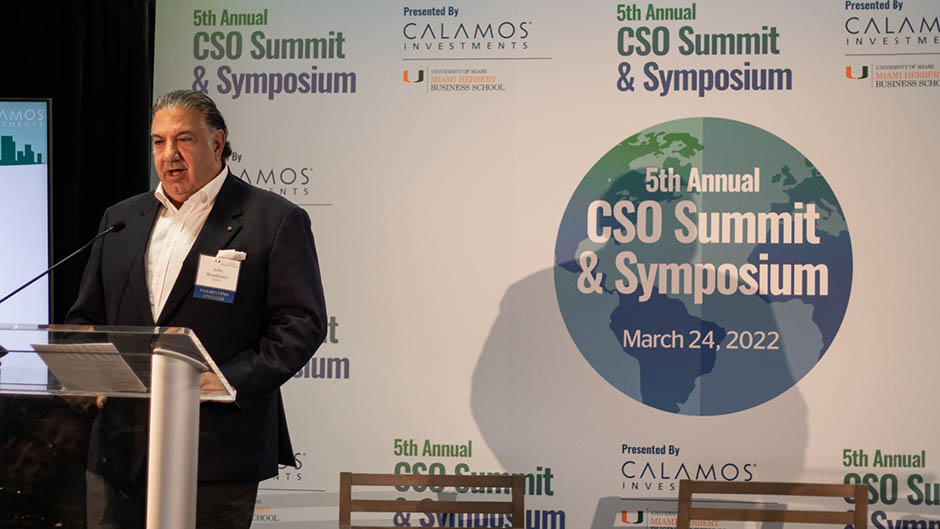On March 24, Miami Herbert Business School hosted its fifth annual Chief Sustainability Officer Summit & Symposium, a day-long virtual and in-person event featuring prominent corporate leaders who joined faculty to discuss the latest developments and future prospects in sustainable business. The premier event supports Miami Herbert’s robust offering in the field, which includes the only STEM-certified Master in Sustainable Business in the United States, as well as a minor for undergraduates and an upcoming co-major option.
“We have been building a solid foundation at Miami Herbert. Now, as the master’s program produces graduates that go out into the world, or undergraduates that move up to the graduate program, we start to see a natural momentum take over,” Daniel Hicks, CSO Summit & Symposium founder and economics lecturer, says in an interview. He calls this year “a turning point” for the event, as corporate sponsors joined the effort.
Orestes Hernandez, philanthropy officer for corporate sponsorships, expands: “In its initial four years, the event helped to put Miami Herbert and the University of Miami at the forefront of the global conversation on sustainable business concepts. Now, in its fifth year, the CSO Summit is sponsored by a number of prominent national brands primarily because of that elevated stature.”
The event was presented by Calamos Investments, a global mutual fund and wealth management company, and additionally sponsored by Southern Glazer's Wine & Spirits, AutoNation, Baptist Health South Florida, and Coca-Cola Beverages Florida.
Discussions included reflections on moments, such as financial crises, social unrest, and more recently the COVID-19 pandemic, that have led to a business perspective more focused on environmental, social, and governance issues.
“ESG was not even an acronym that the financial industry had in its radar until the financial crisis of 2008,” noted speaker John Koudounis, CEO of Calamos Investments. “In the coming years, ESG will not only be a main component of investing, but also one of the top drivers to reaching positive flows and driving outcomes.”
Yet steering companies towards a greater impact on societal wellbeing is not void of challenges, observed CSO of Apollo Global Management Dave Stangis. “It is more complicated than just trying to do the right thing,” he stated. “There is much governance, transparency, and engagement that is required.”
Chief sustainability officers work to identify the opportunities and handle the challenges, which include mitigating a company’s environmental footprint, addressing societal concerns, and preparing for and responding to a crisis.
Royal Caribbean CSO Silvia Garrigo, for instance, spoke of the company’s operations as “a floating city” requiring in-house power generation, water production, and waste management while striving to be “good stewards” of the societies and communities that they visit.
Similarly, Jennifer Motles, CSO of Philip Morris International, spoke about such goals as eradicating child labor in some of the countries of their supply chain, transforming factories from cigarette production sites to other products, and preparing workers with the necessary skills to adjust to the changes.
Represented firms also included Boston Scientific, the Florida Hospital Association, Miami Dolphins, HSBC, Deloitte & Touche, and Office Depot, among others, as summit sessions spanned topics across the health care, sports, investment, and corporate reporting industries. Former University of Miami president and current Trustee Professor of Political Science and Health Policy Donna Shalala as well as former NBA player Amar’e Stoudemire also headlined conference sessions.
The event additionally emphasized entrepreneurship, with innovators from around the world gathering to present their solutions for more sustainable products and businesses through Miami Herbert’s new UScale program.
“Miami Herbert is bringing in thought leaders from around the world to work and interact with their students,” noted Erin Black, vice president of sustainability and risk management at Coca-Cola Beverages Florida. “Faculty are bringing startups in the entrepreneurial space but also have that long-term thinking of what a holistic and healthy supply chain looks like in a business. When you combine those two things together, it’s a win.”
Hicks hopes to further strengthen the CSO Summit as a gathering of corporate and academic thought leadership, a local networking opportunity, and a source for information and cutting-edge research for students, sustainability professionals, and the broader business community. As the annual symposium gains visibility and support, he is poised to meet his objective.

